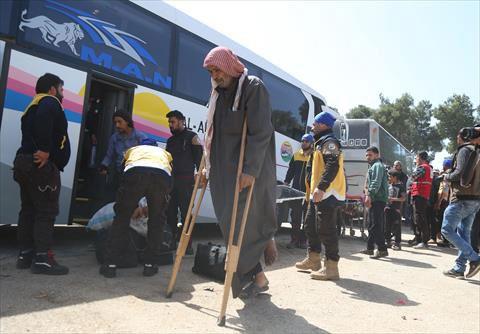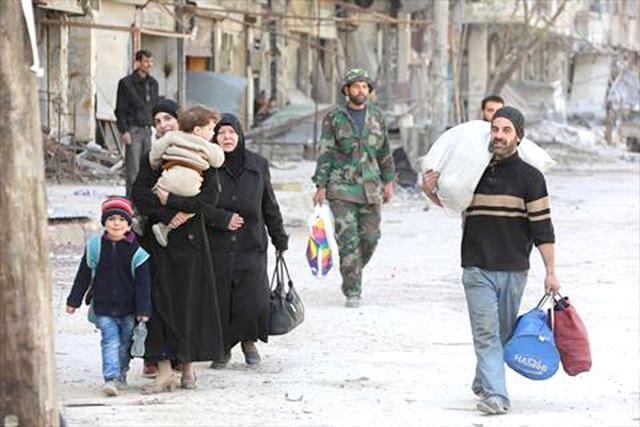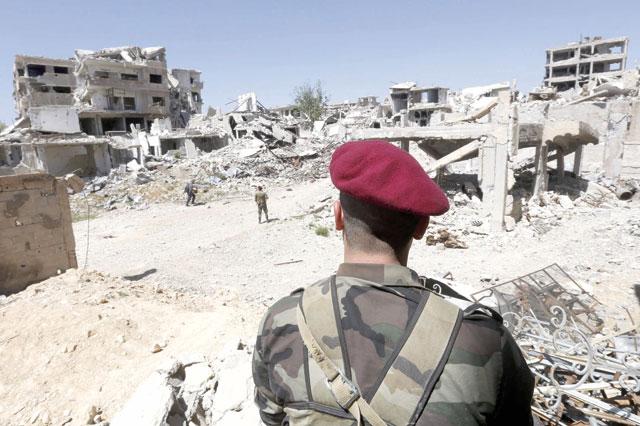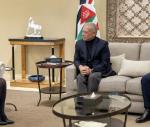You are here
Biggest convoy yet evacuates Syria’s ruined Ghouta
By AFP - Mar 27,2018 - Last updated at Mar 27,2018

A man walks with crutches after the fifth convoy, carrying those evacuated from Eastern Ghouta besieged by the Assad regime and its supporters, arrives in Hama province, Syria, on Tuesday (Anadolu Agency photo)
DAMASCUS, Syria — The largest convoy yet of Eastern Ghouta evacuees arrived in northwestern Syria on Tuesday and the regime threatened to resume its blitz if the last holdout of rebels do not follow suit.
Government troops, backed by Russia and loyalist militia, launched a ferocious assault more than a month ago to retake the enclave on the outskirts of Damascus.
They have recaptured more than 90 per cent of it and are draining the last rebel-held pockets through negotiated withdrawals brokered by Russia.
Russia and the Syrian regime it supports reportedly threatened to resume their blistering bombardment if the last holdout pocket that includes the main Ghouta town of Douma does not agree to a similar deal.
Jaish Al Islam, the powerful rebel faction that holds Douma, had hoped talks with Moscow would result in their staying in the town, instead of being bussed out like other rebels.
But negotiations have stalled and Russia is reverting to its initial “leave or die” approach, two opposition sources close to the negotiations said.
“At the end of their meeting on Monday, the Russians gave Jaish Al Islam two choices: surrender or face an attack,” one of them told AFP.
Jaish Al Islam spokesman Hamza Bayraqdar had said the negotiations were for a deal whereby the group lays down its heavy weapons in exchange for government-provided water and electricity returning to the town.
Two deals have already seen thousands of rebels, their relatives and other civilians bussed out of bombed-out Ghouta districts to Idlib, a northwestern province most of which still escapes government control.
Thousands board buses
The largest numbers have quit the towns of Arbin and Zamalka, and the adjacent district of Jobar, all controlled by the Faylaq Al Rahman faction.
The group reached a deal with Moscow on Friday and its implementation began the following morning with nearly 1,000 people boarding buses and leaving.
The numbers have grown steadily since, with the biggest convoy yet departing in the early hours of Tuesday with more than 6,700 people aboard.
They arrived Tuesday afternoon to the Qalaat Al Madiq area of central Hama province, a staging ground frequently used in such deals, an AFP correspondent said.
That convoy brought the total number of evacuees from areas under Faylaq Al Rahman’s control to 13,165 people.
The group’s spokesman, Wael Alwan, has said as many as 30,000 people could be evacuated in all.
The evacuations were continuing on Tuesday, with more than 1,770 boarding buses in the Faylaq-controlled pocket, said state news agency SANA.
President Bashar Assad has used such evacuation agreements to recover swathes of territory since the uprising against his rule began seven years ago this month.
They have usually begun with the military encirclement of an area, followed by bombardment and a ground operation before a deal is reached.
Eastern Ghouta lies within mortar range of Damascus, and rebels had repeatedly used it as a launch pad for rocket attacks on the capital.
The regime responded with a crippling half-decade siege of the enclave’s 400,000 residents, sealing off access to food, medicines and other goods.
Rebel prisoners freed
On February 18, the regime, its ally Russia and loyalist militia launched an all-out air and ground assault that killed more than 1,600 civilians, according to the Syrian Observatory for Human Rights.
The Britain-based monitor said it had also documented the detention of more than 40 men and boys by Syrian troops in recaptured areas.
Devastating air strikes and artillery fire have reduced large parts of Ghouta to ruins, forcing their residents to abandon them.
Some 110,000 people have fled into government-held territory, most of them on foot or motorbike, through corridors opened up by the army and its Russian allies, according to state media.
The United Nations says around 55,000 of them are housed in very basic conditions in regime-run temporary shelters on the edge of Ghouta.
Moscow has brokered talks with the rebel groups that control the three remaining pockets of the enclave.
The first agreement, with hardline group Ahrar Al Sham, saw more than 4,500 people, including rebel fighters, leave the town of Harasta last week.
Under the second deal, rebels from Faylaq Al Rahman are being given safe passage to the northwest, along with thousands of civilians, in exchange for releasing prisoners they were holding.
Eight were freed on Sunday and another 26 the following day, SANA said.
Related Articles
ARBIN, Syria — Syrian rebels and civilians prepared on Saturday to evacuate the penultimate opposition-held pocket of Eastern Ghouta, a
HARASTA, Syria — Nearly 2,000 Syrian rebels and civilians began leaving a ravaged pocket of Eastern Ghouta on Sunday, in fresh evacuations t
DAMASCUS, Syria — Syria's regime drew closer to taking full control of Eastern Ghouta on Monday as state media reported that fighters began



















